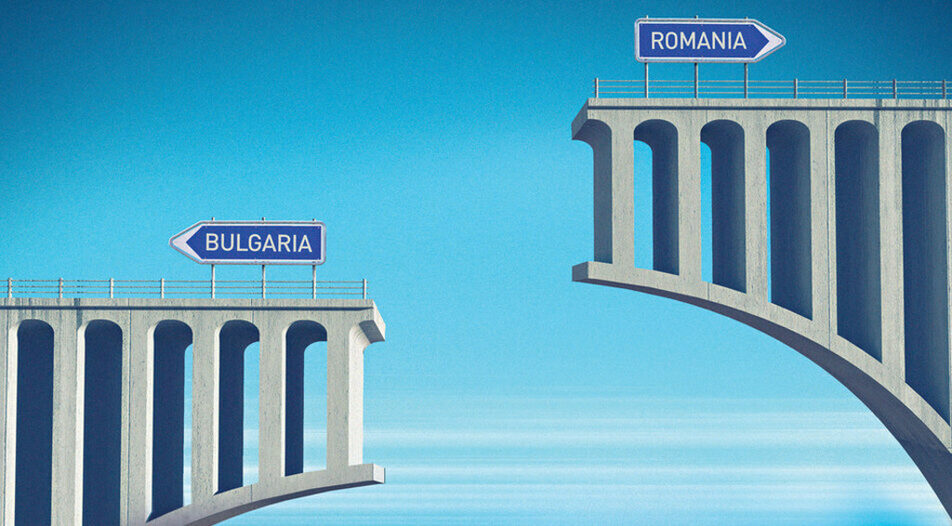- While Bulgaria built a state-controlled system of corruption, Romania began to dismantle it.
- Romania is performing many times better than Bulgaria on several economic indicators.
- Those living north of the Danube do not yet feel rich but the rapid advance towards the Western European standard will change that.
Bulgaria and Romania started side by side in the EU 15 years ago. Now Bucharest has advanced much farther than Sofia. For Bulgaria, the Schengen area is still far away, its roads are still potholed, and the two bridges over the Danube seem increasingly long and difficult to cross. The two economies went through several crises and after each one, the Romanian one accelerated better. The most serious but subtle difference is that on the northern bank of the river mentality has changed slowly but significantly. To find out what is behind the Romanian model that helped the country speed up, a Capital Weekly team crossed the Danube River and talked with economists, analysts, politicians, and businessmen from Bucharest and Cluj.
Let's start with statistics
Crossing the Danube Bridge at Ruse is an adventure. The huge and growing queues of trucks and the not-so-good infrastructure on both sides of the bridge, reinforce the feeling that you are in a frontier region with few connections to the rest of the world.
Romania, especially in its southernmost geographical region of Wallachia, feels like Bulgaria. The roads are in bad shape, and everything within tens of kilometers around the capital Bucharest is scattered villages and neighborhoods, sucked in by the centrifuge of the metropolis.
But entering the city, which according to statistics is home to just under 2 million people and unofficially closer to 3 million, changes the first impression. Bucharest, which is a separate administrative region in Romania, is extremely rich. In terms of GDP per capita in purchasing power parity, it is richer than Vienna and almost twice as developed as Bulgarian capital Sofia.
This is an example of what has happened in Romania in recent years. Almost on a par with Bulgaria in terms of GDP per capita in 2005-2006, Romania's indicator has risen by 41 percentage points by 2022, overtaking Croatia and leveling with Hungary and Portugal at 77% of the EU average. This is twice as fast as Bulgaria's growth rate for the same period, which is currently at 59% of the EU average.
GDP is usually not the most reliable measure of whether a country's citizens are feeling better off, but Romania's statistical indicators are emphatic in every area. The rise in living standards is also evident in consumption data, where the gap between the two countries has rapidly widened after 2007 in favor of Romania. According to Eurostat data, the average annual salary in Romania reached 13 thousand euro in 2021, while in Bulgaria it was nearly 20% lower.
Still a kitten, not a tiger
If you talk to Romanians in the street, they still don't feel that. Like Bulgarians, they still think they are lagging behind EU peers and say they are not well paid. This is due to several factors. Average salaries in the country have increased more compared to Bulgaria but Romania still has the third lowest minimum wage in the EU - 515 euro per month, compared to 400 euro in Bulgaria, having overtaken only Latvia (500 euro).Monica Roman, professor of economics at the Bucharest University of Economic Studies says that for her, one of the most positive things the government has done in recent years for Romania's economic development is the jump in the minimum wage. It has been raised 15 times since 2011 along with pensions. This has increased the purchasing power of the population - according to Bulgarian businesses operating in Romania, the average value of a shopping cart for a Romanian is 3-4 times higher than in Bulgaria.
However, the still low wages compared to Western European standards, at the same time skewed towards the lower income brackets, explain the lack of feeling of an "economic tiger".
The other reason is that the country has not yet seen big infrastructure projects to reflect this growth. In addition, the wealth is unevenly distributed, being concentrated in several regions. Although these regions are much more developed compared to their Bulgarian counterparts, they cannot change the general feeling in a country of 19 million people.
Come again soon
That's about to change. Several indicators predict the future. First, the slow but certain transformation of Romania from a country known for its outward economic migration to a country that receives economic migrants. According to statistics, in 2016 the annual quota for non-EU workers in Romania was 3 thousand people. In 2022, the figure is 100 thousand. They come mainly from Asia - Sri Lanka, Bangladesh, and Vietnam, and are mostly attracted to the construction sector, but they are also present in others such as agriculture, says former Minister of Labor Victoria-Violeta Alexandru.
In Romania, there is the same problem with the brain drain as in Bulgaria. Here, however, there are attempts to bring people back. Meanwhile, Romania compensates by effectively attracting professionals from the East, with whom employers are extremely satisfied.
Victoria-Violeta Alexandru
former Labor Minister and current Liberal MP
Another important indicator is gross capital formation, which describes how efficiently investment moves in the economy. According to an analysis by Lachezar Bogdanov from Sofia-based Institute for Market Economics, during the last 5 years, investments have been moving at an annual growth rate of nearly 4.5% in Romania, compared to 0.2% in Bulgaria. In other words, 57% more investment was made in the Romanian economy in 2022 compared to 2010, and in the Bulgarian economy this indicator of change is negative at -3%.
People, mountains, and something else
And here our journey across the Danube comes to the most important question - how come Bulgaria and Romania are so different, and why will they become more and more different in the future? How has Romania sped up so quickly although it is close in mentality, historical background and economic development to Bulgaria?
There are two structural factors and one political factor in play for this difference.
The structural ones are the larger market and the geographical proximity to Western Europe. Romania consists of three large geographical regions and has three political cultures with different traditions, says Prof. Cristian Pirvulescu, Dean of the Faculty of Political Sciences at the National University of Political Studies and Public Administration in Bucharest. "Wallachia is more like Bulgaria, Moldova is poorer and connected to Russia. Transylvania is very different. They are the engine of development along with the big cities - Bucharest, Timișoara, Cluj, and even Iași", he explains.
A state with corruption versus corruption having a state
The other big reason is the success in the fight against corruption that Romania started in earnest years ago.
To understand how astonishing this divergence is, here's a comparison: when it entered the EU, Romania was where Bulgaria is in 2020 - one party controlled almost everything, from mayors to central government. Corruption was well organized and fraud at all levels was ubiquitous.
Traian Basescu, elected in 2004 as president, had a small window of time in which to put Monica Macovei as justice minister. She reformed the pro-forma created years earlier Anti-Corruption Directorate and turned it into a real tool for fighting political corruption. She also succeeded in appointing 33-year-old Laura Kövesi as chief prosecutor, shortly before parliament stripped the minister of the right to do so.
What followed looks more like a civil war or operation Clean Hands in Italy. Within the first three years alone, more than 400 politicians were charged, and dozens of them went to prison. In the annual reports of the anti-corruption prosecutor's office, there are thousands of cases filed for corruption against every level of government - from the local to the national government. In 2012, a former Prime Minister was convicted, in 2015 five ministers, 21 deputies and the mayor of Bucharest were convicted.
So it turns out that all Romania needed at that moment were two women with will and courage and a little carelessness on the part of the politicians. Analyst Pirvulescu believes that this was a one-time chance. "Today what happened before would not be possible in Romania. In this illiberal Europe, no. I see what is happening in Israel, Hungary."
According to the Bulgarian Anti-Corruption Fund (ACF), an NGO which has been monitoring the development of the most significant investigations at the highest levels, lawsuits were filed for 63 crimes in 49 cases in Bulgaria between 2014 and 2020. The overall ratio of effective convictions to acquittals in the cases analyzed by the ACF, referring only to the upper echelons of power, is three to fourteen. Not a single government minister has been convicted to a jail term on graft charges in Bulgaria.
Unlike all other tracks, on which they run somewhat comparably, Bulgaria and Romania live in different galaxies when it comes to fighting corruption. It feels like they are not separated by the Danube River but by an ocean. An interesting result is that in Romania, in contrast to Bulgaria, there is no institutionalized practice of stealing European funds.
"Politicians were afraid to do it," says Dan Barna, former minister of European funds and vice-president of opposition Save Romania Union, the third-largest party in the current parliament. According to a study, only 1 out of 7 European contracts is awarded to a single candidate, while in Bulgaria it is close to 1 out of every 2.
Romanians today live much better than 10 years ago and therefore they are not interested in politics. Entrepreneurship is certainly more developed today, but political enthusiasm and common goals are lacking. That is why corruption remains in the background of media attention.
Dan Barna
former minister of European funds and vice-president of opposition Save Romania Union,
To sum it up, since joining the EU, Bulgaria has established a model of state-controlled corruption, while Romania has dismantled it. "My main credit was in opening people's eyes to the fact that there are no untouchables. And they liked that," says Monica Macovei, a former Romanian minister of justice and perhaps the best-known judicial reformer in the former Soviet bloc.
- While Bulgaria built a state-controlled system of corruption, Romania began to dismantle it.
- Romania is performing many times better than Bulgaria on several economic indicators.
- Those living north of the Danube do not yet feel rich but the rapid advance towards the Western European standard will change that.
Bulgaria and Romania started side by side in the EU 15 years ago. Now Bucharest has advanced much farther than Sofia. For Bulgaria, the Schengen area is still far away, its roads are still potholed, and the two bridges over the Danube seem increasingly long and difficult to cross. The two economies went through several crises and after each one, the Romanian one accelerated better. The most serious but subtle difference is that on the northern bank of the river mentality has changed slowly but significantly. To find out what is behind the Romanian model that helped the country speed up, a Capital Weekly team crossed the Danube River and talked with economists, analysts, politicians, and businessmen from Bucharest and Cluj.












